(Note: This post will focus on The Mummy and The Mummy Returns. As far as I’m concerned, there is no third movie.)
Between the trip to Disneyland and a selection of concerts featuring the most influential artists of my childhood, the past few months have been a bit of a whirlwind of nostalgia. Just when I thought I could escape its pull, I checked out the next request and promptly gave up any hope of surfacing.
When I recount the formative narratives of my childhood, The Mummy rarely gets a mention. It’s all superheroes and princesses and cats who eat pizza before and after doing martial arts. Still, whenever I adopt a zombie pose, I get the urge to to chant “Imhotep! Imhotep!” instead of “Brains!” When I thank people for their hospitality, I have to bite back the words, “And your eyes, and your tongue.” I even have the film to thank for my short-lived desire to become an Egyptologist. Looking back now, however, I see that it was also the source of one of the most important strong female characters of my childhood: Evelyn “Evie” Carnahan O’Connell. Although the marketing department clearly thought that Rick O’Connell was the film’s hero, I would argue that Evelyn is the actual protagonist. It is her quest, her dream, her mistake, and her decision to set it right.
First, some background: the eponymous mummy is Imhotep, a high priest who falls in love with the Pharaoh’s mistress, Anck-su-namun. When the Pharaoh discovers her infidelity, the two lovers murder him. When his guards arrive, she kills herself, confident that Imhotep will resurrect her. Just before he restores her to life, however, he is discovered; for his crime, he is cursed and buried alive to be eaten by insects. The curse is less a punishment for Imhotep than a punishment for the people who awaken him, as he comes back with the ability to conjure not only the plagues of Egypt, but sandstorms in the shape of his face.
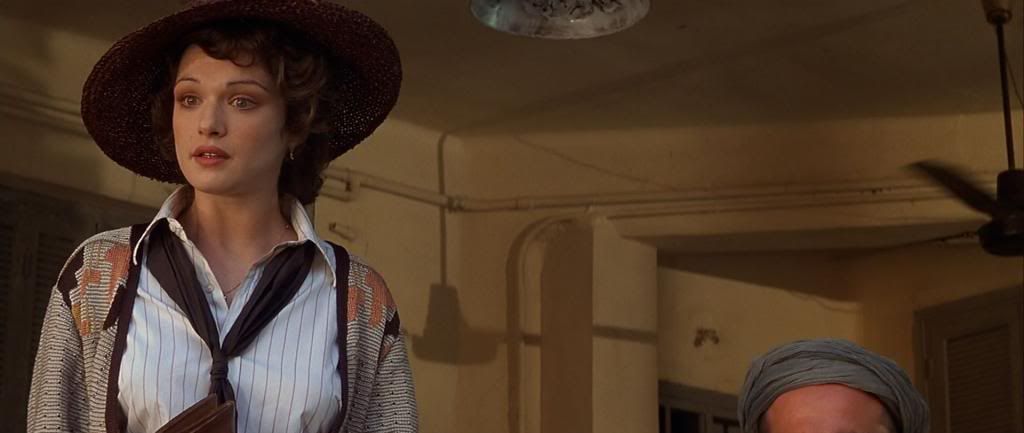 |
| Screencaps: fight-tomorrow.net |
Thousands of years later, Evelyn’s brother, Jonathan, finds a key and a map to the lost city of Hamunaptra, a place that Evelyn has researched extensively. When they decide to locate the city, they take as their guide Rick O’Connell, a former Colonel of the French Foreign Legion and obvious leading man. In Hamunaptra, they find Imhotep, the Book of the Dead, and a whole heap of trouble.
Evie is introduced as a fascinating combination of ultra-competence and utter hopelessness, the kind of woman brilliant enough to understand multiple forms of ancient languages, yet clumsy enough to demolish an entire library’s worth of shelves while replacing a single book. She owes her job at the library not to her own talents, but to her late parents’ patronage of the institution. Her application to join the Bembridge scholars has been rejected multiple times, always with the explanation of a lack of field experience. She’s a woman with something to prove, and The Mummy is the story of how she does it.
While Rick gets the big action-filled set pieces, it is Evie who controls most of the plot. She saves Rick’s life soon after meeting him, and he later mentions this as the only reason he has chosen to return to Hamunaptra. The quest itself is intended as a search for the Book of Amun-Ra, the artifact that first interested Evelyn in Egypt, the hunt for which she calls her “life’s pursuit.” When they find the Book of the Dead, it’s Evie who decides to read from it, saying, “It’s just a book. No harm ever came from reading a book.” When this ostensibly harmless bit of reading leads to the release of an ancient evil, Rick plans to make it someone else’s problem. Evelyn refuses to run away, takes ownership of her mistake, and vows to set things right. Even her eventual capture is proof of her agency; she chooses to go with Imhotep in order to save her companions. In almost every situation, Evelyn is the one making the decisions and dealing with the consequences.
One of the things that I most appreciate about her is the fact that the narrative allows her to make mistakes. She’s introduced doing something foolish that ultimately causes significant damage and prompts her boss to compare her unfavourably to the Egyptian plagues. Later, she resurrects a being with potentially apocalyptic power. Where the film succeeds is in not condemning her -- or even judging her too harshly, really -- for these decisions. She combats her boss’s assertion of her ineptitude with proof of her competence. Instead of claiming ignorance as an excuse to get out of dealing with the Imhotep problem, she assumes the responsibility to vanquish him.
The way she goes about doing this sets her apart from many of the strong female characters that populate action films today. Evelyn is basically all brains and very little brawn. When she has to fight other characters, her first reaction is not to launch into a perfectly choreographed battle, but to shove a lit candle into her attacker’s eye. In the climactic scene, when the leading lady would usually fight the villain’s girlfriend or female partner in crime, Evie spends most of her time running away from Anck-su-namun. She’s the anti-Action Girl.
Evelyn prefers to lay an intellectual smackdown. In Hamunaptra, one of the members of the rival expedition observes, “They are led by a woman. What does a woman know?” As it turns out, basically everything. The characters’ survival and their progress through the plot often relies on Evie’s deductive skills as well as her ability to translate ancient Egyptian hieroglyphs in high stress situations. It is her translation skills that allow Jonathan to gain control of the Pharaoh’s guards, who rob Imhotep of his immortality. Without her, Rick couldn’t have killed him. While Rick performs all the swashbuckling antics, Evie does all the intellectual heavy lifting.
Even as Evelyn plays an integral role in defeating Imhotep, the film gives her another victory: intellectual superiority over the Bembridge scholars. They claimed that the two incantation books were in Hamunaptra, the Book of Amun-Ra at the base of the statue of Anubis and the Book of the Dead hidden in the statue of Horus. Evie discovers that they mistranslated the source of this information, and in her own translation, she finds that the two locations should be switched. Upon finding this, she exclaims, “Take that, Bembridge scholars!” Even with an army of zombified people and a nearly restored mummy outside, urging the plot onwards, you still want to take a moment to bask in her joy at being better than the people who rejected her.
What makes Evie’s portrayal in the first film even more extraordinary is the fact that she is canonically biracial. Unsurprisingly, her actor isn’t. The film’s treatment of race tends to be quite dubious, painting most of its characters of colour as villains, greedy, immoral cowards, or cannon fodder. The Medjai warrior, Ardeth Bay, manages to defy this characterization, but he still sacrifices himself to save the white and half-white people (even if his death doesn’t stick). Setting aside the casting issues, the fact that Evie is biracial makes her an even more progressive character. In American cinema, where the smartest guy in the room is almost always white and male, it is very cool to see that distinction go to someone like Evelyn.
Unfortunately, all of this changes in The Mummy Returns. The sequel takes place ten years after the original, in 1933, when the reincarnation of Anck-su-namun and the curator of the British Museum decide to resurrect Imhotep to fight a new Big Bad, the Scorpion King. Evie and Rick get involved when their eight-year-old son, Alex, gets his hand stuck in an artifact that the villains need and is therefore kidnapped. Then it’s a race against time to save Alex and stop the Scorpion King from conquering the world with his supernatural army.
For my purposes, there are two things that matter in this movie: the reincarnation storyline that turns Evelyn into an Action Girl, and her fridging. In this film, Evelyn gets all those choreographed fight scenes that were conspicuously and gloriously missing from the first one. While she explains that she’s picked up some combat moves from Rick, it’s revealed that most of her new tricks are remnants of her past self. It turns out that she was once Nefertiri, the daughter of the Pharaoh who was killed by Imhotep and Anck-su-namun. Her issues with them therefore date back thousands of years, when she witnessed them killing her father.
The Evelyn of the first film was refreshing partially because she wasn’t a badass fighter who could hold her own against men in combat. Too often, that kind of character displays the appearance of power with none of the agency that should accompany it. The same is true of this new Evie. She’s controlled by the memories of her past life, to the extent that she almost falls out of a flying dirigible. She’s driven by the need to protect the Bracelet of Anubis and the boy who wears it, and her duties as both the ancient guardian of the artifact and a mother supersede the thirst for knowledge that defined her character in the first film. It eventually turns out that Rick and Evie are just playing predetermined parts in the defeat of the Scorpion King. The agency of a clever librarian is replaced by the destiny of a warrior princess, and Evelyn’s character suffers a tremendous loss.
As is often the case in stories of destiny, the focus is on the men. Evie’s brilliance is transplanted into her son, and he gets to shine as one of the principal characters. Rick takes centre stage as a father who saves his son and the whitest Medjai ever, destined to kill the Scorpion King. When Alex stands up to Imhotep, the mummy says, “You have strength, little one. You are your father’s son.” Apparently Imhotep forgot that it was Evie, not Rick, who most often defied him and tried to trick him.
Evelyn’s destiny, it appears, is to be killed. Out of the blue, Anck-su-namun stabs her, and Evelyn dies. I don’t mean to be repetitive, but there is so much wrong with this moment that it’s like my brain gets stuck on it. Evelyn, who was the protagonist in the first film, gets fridged in order to fuel Rick’s manpain. She lacks narrative value beyond her role as Alex’s mother and Rick’s wife, and this is confirmed with her last words, with which she tells Rick that she loves him and that he has to take care of Alex. With the possible end of the world looming, the woman who was willing to face an ancient evil on her own because it was the right thing to do doesn’t even mention it? I might understand this scene if she were heroically sacrificing herself to save the world, but she really does just get randomly stabbed out of nowhere before the job’s done. Even her resurrection can’t make up for this.
All you really need to know about Evie is summed up in one of her own lines: “Look, I may not be an explorer, or an adventurer, or a treasure-seeker, or a gunfighter … but I am proud of what I am! … I am a librarian.” In the first film, this is the greatest thing about her: she is a knowledge-seeker, and she doesn’t need fighting skills to be awesome. The second film feels like a betrayal of the essence of Evelyn, replacing her agency with an ostensibly cool backstory that seems to make her stronger even as it weakens her character.
Verdict: Actual strong female character who devolved into a Strong Female Character™ in the sequel
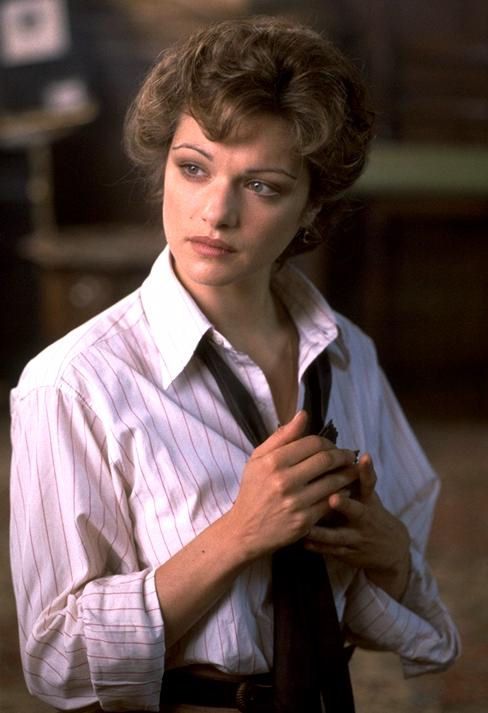
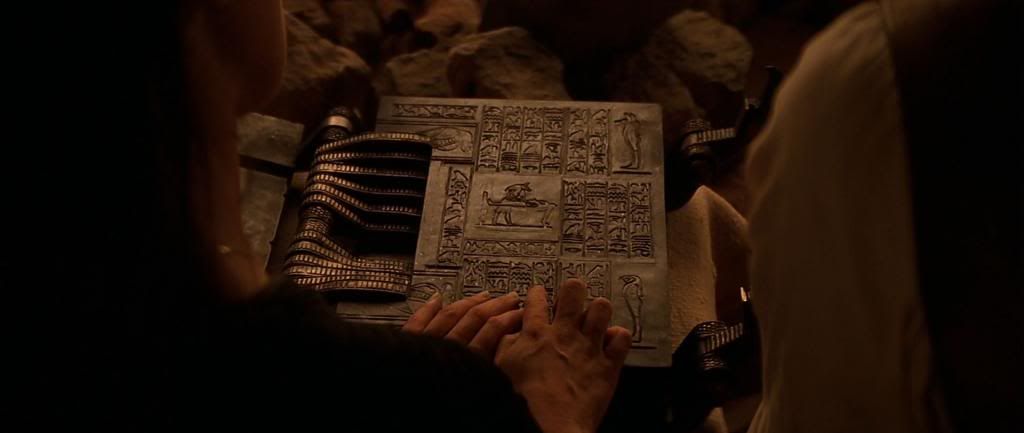

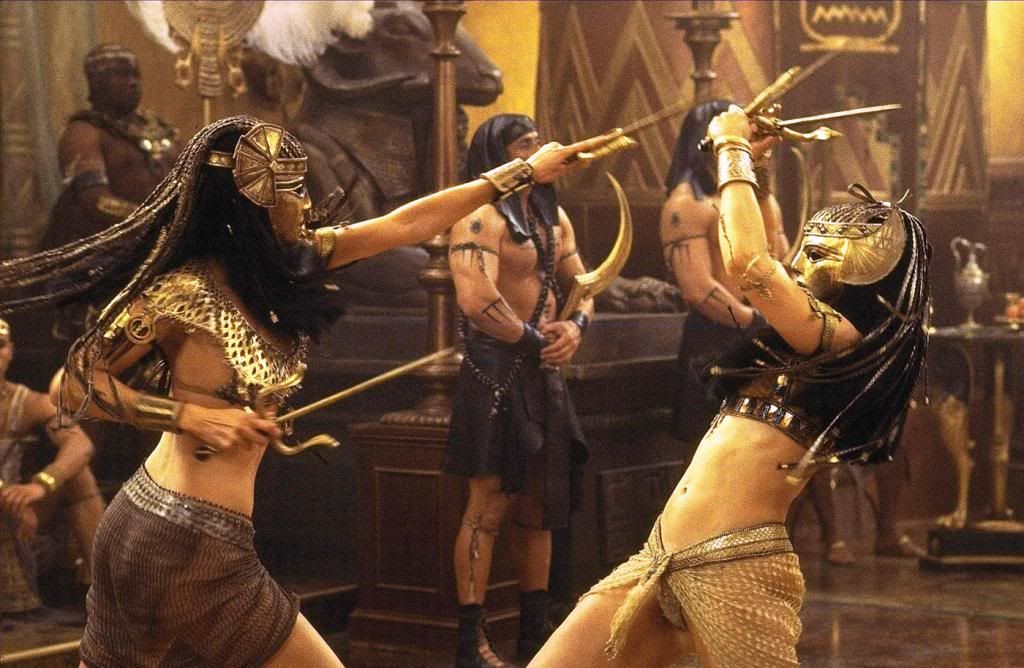
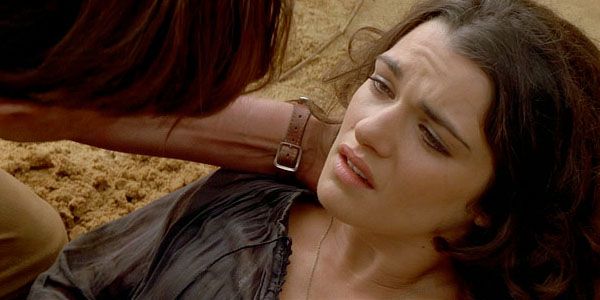
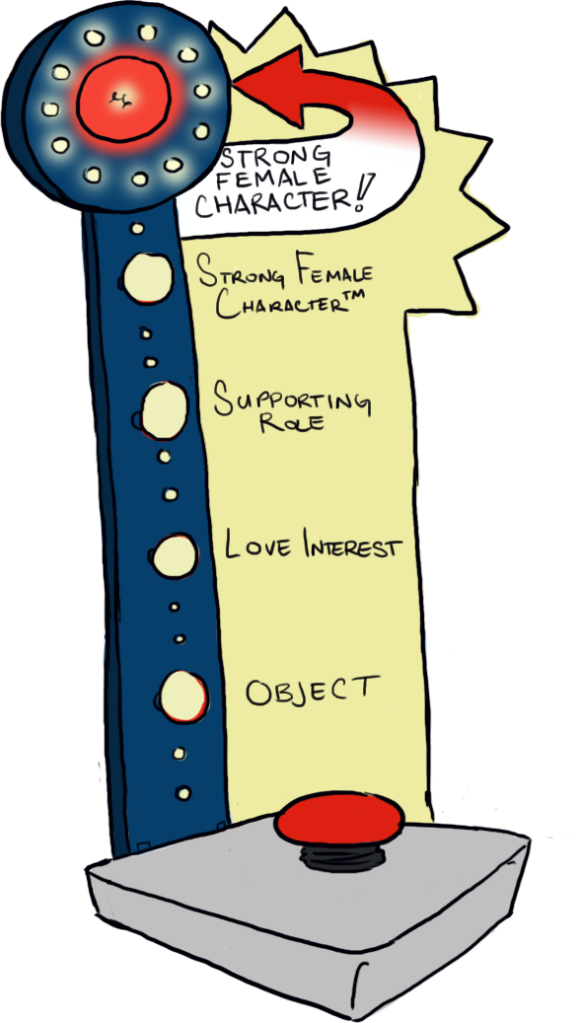
Amo a Rachel,ela é linda e muito talentosa.Acho ela um pouco parecida com Genevieve Cortese,esposa do Jared Padalecki
ReplyDeletethis blew my mind.
ReplyDeleteHow did Imhotep forget about Evelyn all of the sudden? She was the one to defeat him! And instead of Anck vs Evelyn I would rather see her vs Imhotep instead cause of their connection and interest for knowledge
ReplyDeleteEvie is my favorite heroine, and I will always treasure her first-movie role dear to my heart. She is the reason I'm studying to become a librarian today.
ReplyDelete